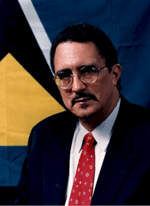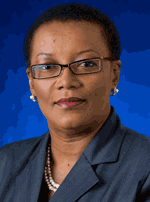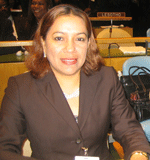(CARICOM Secretariat): THE Caribbean contribution to the recent 7th Summit of the African Caribbean Pacific (ACP) Group of Countries Summit in Malabo, Equatorial Guinea ranged from retrospective through introspective to prospective.
 Chairman of the Caribbean Community (CARICOM), Dr Kenny Anthony, Prime Minister of Saint Lucia, was in the vanguard while the Minister of Foreign Affairs and Foreign Trade of Barbados, Maxine Mc Clean and Minister of Foreign Affairs of Guyana, Carolyn Rodrigues-Birkett rendered sterling and stirring support.
Chairman of the Caribbean Community (CARICOM), Dr Kenny Anthony, Prime Minister of Saint Lucia, was in the vanguard while the Minister of Foreign Affairs and Foreign Trade of Barbados, Maxine Mc Clean and Minister of Foreign Affairs of Guyana, Carolyn Rodrigues-Birkett rendered sterling and stirring support.
Fittingly, Dr Anthony spoke at the Opening Ceremony laying the path which the Ministers paved in their presentations.
Dr Anthony, in his address entitled ‘Our Unity Can Make A Difference’, placed the ACP in context recalling its grounding principles including those of promoting and developing greater and closer trade and economic relations among the Member States and encouraging effective regional and inter-regional cooperation between them. These two themes were expanded by the CARICOM Ministers in their statements, Minister Mc Clean on ‘The Future of Development Financing and the Post-Busan Global Partnership’ and Minister Rodrigues-Birkett on the ‘Status of the ACP Group Towards 2015 & Beyond’.
Another constant in the presentations was graduation or differentiation which has been a dominant and persistent issue for the Caribbean in recent years. The European Union’s New Development Policy has taken that concept on board following in the footsteps of the International Financial Institutions. Graduation is based on criteria established by the particular institution to determine what level of development financing a country should receive. With Gross Domestic Product (GDP) per capita being one of the criteria, several CARICOM Member States have found themselves excluded thus losing out on significant development finance resources because of their relatively high status in that regard.
The new EU Development Policy, should it be implemented with the graduation criteria intact, would have a major impact on the Region given that the EU is the major development finance source for CARICOM Member States. In raising the issue at the Summit, Senator Mc Clean pointed out t hat such classification does not recognise the true vulnerability of many of the ACP countries, in the Caribbean and the Pacific in particular where a single catastrophic event can destroy the economies of these small island developing states (SIDS).
hat such classification does not recognise the true vulnerability of many of the ACP countries, in the Caribbean and the Pacific in particular where a single catastrophic event can destroy the economies of these small island developing states (SIDS).
The Caribbean countries have been pressing their case with respect to graduation at every opportunity and have enlisted the assistance of countries such as Brazil, Canada and Mexico in fora where CARICOM does not have a voice.
It is just such an issue that the Caribbean put forward as one in which the ACP could show its collective strength. Having now grown from the original 46 to 79 countries the Caribbean exhorted the Group to focus its strength on critical issues affecting the daily lives of the millions of people in those countries.
Given the current global situation, the Caribbean argued that the time had come for the ACP to use its advantages of decades of inter-regional solidarity on various global issues such as trade, development finance, political dialogue and its relations with other international and regional organisations.
The Region called for ACP to reach out for new and diversified partnerships away from the sole link with the EU and cited the BRICS as one grouping with which a valuable linkage could be forged. This initiative assumes even greater importance as the present situation of the EU constrains it to devoting more time and resources to its Member States.
The decisive push from the Caribbean, however, came for strengthening bonds among ACP states. As Minister Rodrigues-Birkett put it, “solidarity and unity of the ACP cannot be a message of convenience. It has to be demonstrated and deepened in practice, through Intra-ACP Cooperation, at the political level, in trade and investment, in effectively using development assistance to accomplish the Millennium Development Goals (MDGs), by cultural, scientific and technological cooperation.”
The ACP, the Caribbean argued should be the leader in South-South co-operation and suggested one or two fertile areas in which this co-operation could bear fruit such as a specialized ACP Trade Financing Facility with technical assistance for sound investment proposals. There are also foundations to be built upon from existing co-operation models among the ACP states.
In the ACP’s favour is its control of critical human and natural resources which could allow it as a group to take advantage of some of the opportunities created by recent global developments including the continued rise in commodity prices and the growing demand for commodities, especially among the members of the BRICS.
Minister Mc Clean put it all in perspective by stressing that “we must strive for an ACP Partnership” that will be characterised by among other things South-South/Triangular Cooperation, Private Sector Involvement and increased collaboration among Regional Organisations.
The CARICOM Chairman summed it all up with the words: “at this time of economic distress worldwide, we must look beyond our boundaries for ways in which our unity can make a difference to solutions, and work among ourselves and with other developing countries to bring hope to our people and credit to our group.”



.jpg)








